Evaluating Ethics in Business: Australian Banking Sector Issues
VerifiedAdded on 2023/03/21
|7
|1995
|55
Essay
AI Summary
This essay critically evaluates the significance of ethics in business, particularly within the Australian banking sector, in light of the ethical issues revealed by the Banking Royal Commission. It explores the importance of corporate governance and stakeholder theories in mitigating negative impacts on stakeholders and fostering a just society. The essay examines various incidents, such as sexual harassment at AMP Limited and banks charging fees for no service, to illustrate the consequences of unethical practices. It applies ethical frameworks like utilitarianism to assess actions and emphasizes the role of business ethics in ensuring transparency, accountability, and the prioritization of stakeholder interests over profit maximization. The essay concludes by highlighting the crucial role of ethics in defining acceptable behavior, promoting self-evaluation, and fostering a fair and equitable business environment. This analysis draws upon the Royal Commission's findings to underscore the far-reaching effects of ethical failures on various stakeholders within the banking sector.

0
Ethics and Business
Ethics and Business
Paraphrase This Document
Need a fresh take? Get an instant paraphrase of this document with our AI Paraphraser
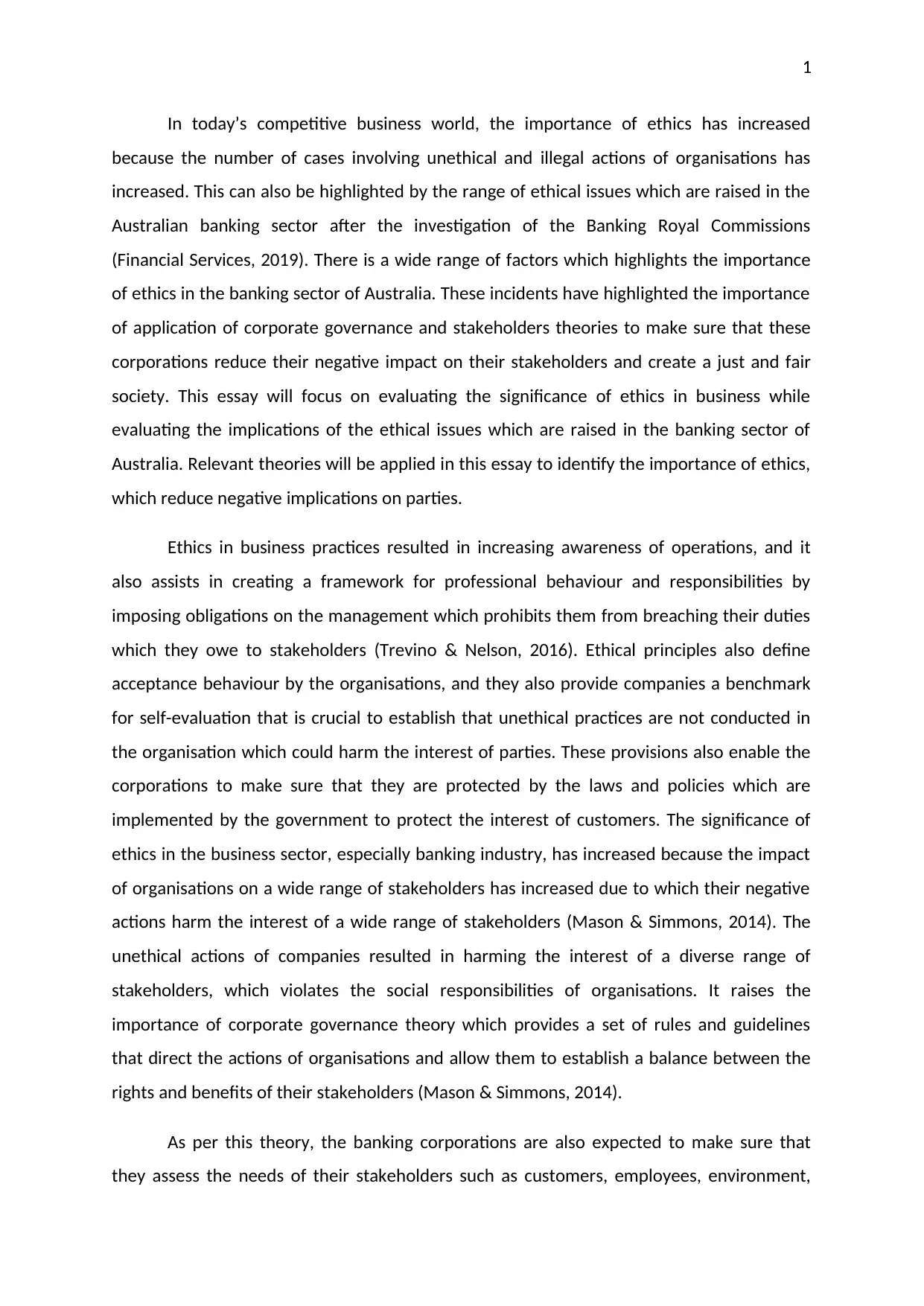
1
In today’s competitive business world, the importance of ethics has increased
because the number of cases involving unethical and illegal actions of organisations has
increased. This can also be highlighted by the range of ethical issues which are raised in the
Australian banking sector after the investigation of the Banking Royal Commissions
(Financial Services, 2019). There is a wide range of factors which highlights the importance
of ethics in the banking sector of Australia. These incidents have highlighted the importance
of application of corporate governance and stakeholders theories to make sure that these
corporations reduce their negative impact on their stakeholders and create a just and fair
society. This essay will focus on evaluating the significance of ethics in business while
evaluating the implications of the ethical issues which are raised in the banking sector of
Australia. Relevant theories will be applied in this essay to identify the importance of ethics,
which reduce negative implications on parties.
Ethics in business practices resulted in increasing awareness of operations, and it
also assists in creating a framework for professional behaviour and responsibilities by
imposing obligations on the management which prohibits them from breaching their duties
which they owe to stakeholders (Trevino & Nelson, 2016). Ethical principles also define
acceptance behaviour by the organisations, and they also provide companies a benchmark
for self-evaluation that is crucial to establish that unethical practices are not conducted in
the organisation which could harm the interest of parties. These provisions also enable the
corporations to make sure that they are protected by the laws and policies which are
implemented by the government to protect the interest of customers. The significance of
ethics in the business sector, especially banking industry, has increased because the impact
of organisations on a wide range of stakeholders has increased due to which their negative
actions harm the interest of a wide range of stakeholders (Mason & Simmons, 2014). The
unethical actions of companies resulted in harming the interest of a diverse range of
stakeholders, which violates the social responsibilities of organisations. It raises the
importance of corporate governance theory which provides a set of rules and guidelines
that direct the actions of organisations and allow them to establish a balance between the
rights and benefits of their stakeholders (Mason & Simmons, 2014).
As per this theory, the banking corporations are also expected to make sure that
they assess the needs of their stakeholders such as customers, employees, environment,
In today’s competitive business world, the importance of ethics has increased
because the number of cases involving unethical and illegal actions of organisations has
increased. This can also be highlighted by the range of ethical issues which are raised in the
Australian banking sector after the investigation of the Banking Royal Commissions
(Financial Services, 2019). There is a wide range of factors which highlights the importance
of ethics in the banking sector of Australia. These incidents have highlighted the importance
of application of corporate governance and stakeholders theories to make sure that these
corporations reduce their negative impact on their stakeholders and create a just and fair
society. This essay will focus on evaluating the significance of ethics in business while
evaluating the implications of the ethical issues which are raised in the banking sector of
Australia. Relevant theories will be applied in this essay to identify the importance of ethics,
which reduce negative implications on parties.
Ethics in business practices resulted in increasing awareness of operations, and it
also assists in creating a framework for professional behaviour and responsibilities by
imposing obligations on the management which prohibits them from breaching their duties
which they owe to stakeholders (Trevino & Nelson, 2016). Ethical principles also define
acceptance behaviour by the organisations, and they also provide companies a benchmark
for self-evaluation that is crucial to establish that unethical practices are not conducted in
the organisation which could harm the interest of parties. These provisions also enable the
corporations to make sure that they are protected by the laws and policies which are
implemented by the government to protect the interest of customers. The significance of
ethics in the business sector, especially banking industry, has increased because the impact
of organisations on a wide range of stakeholders has increased due to which their negative
actions harm the interest of a wide range of stakeholders (Mason & Simmons, 2014). The
unethical actions of companies resulted in harming the interest of a diverse range of
stakeholders, which violates the social responsibilities of organisations. It raises the
importance of corporate governance theory which provides a set of rules and guidelines
that direct the actions of organisations and allow them to establish a balance between the
rights and benefits of their stakeholders (Mason & Simmons, 2014).
As per this theory, the banking corporations are also expected to make sure that
they assess the needs of their stakeholders such as customers, employees, environment,
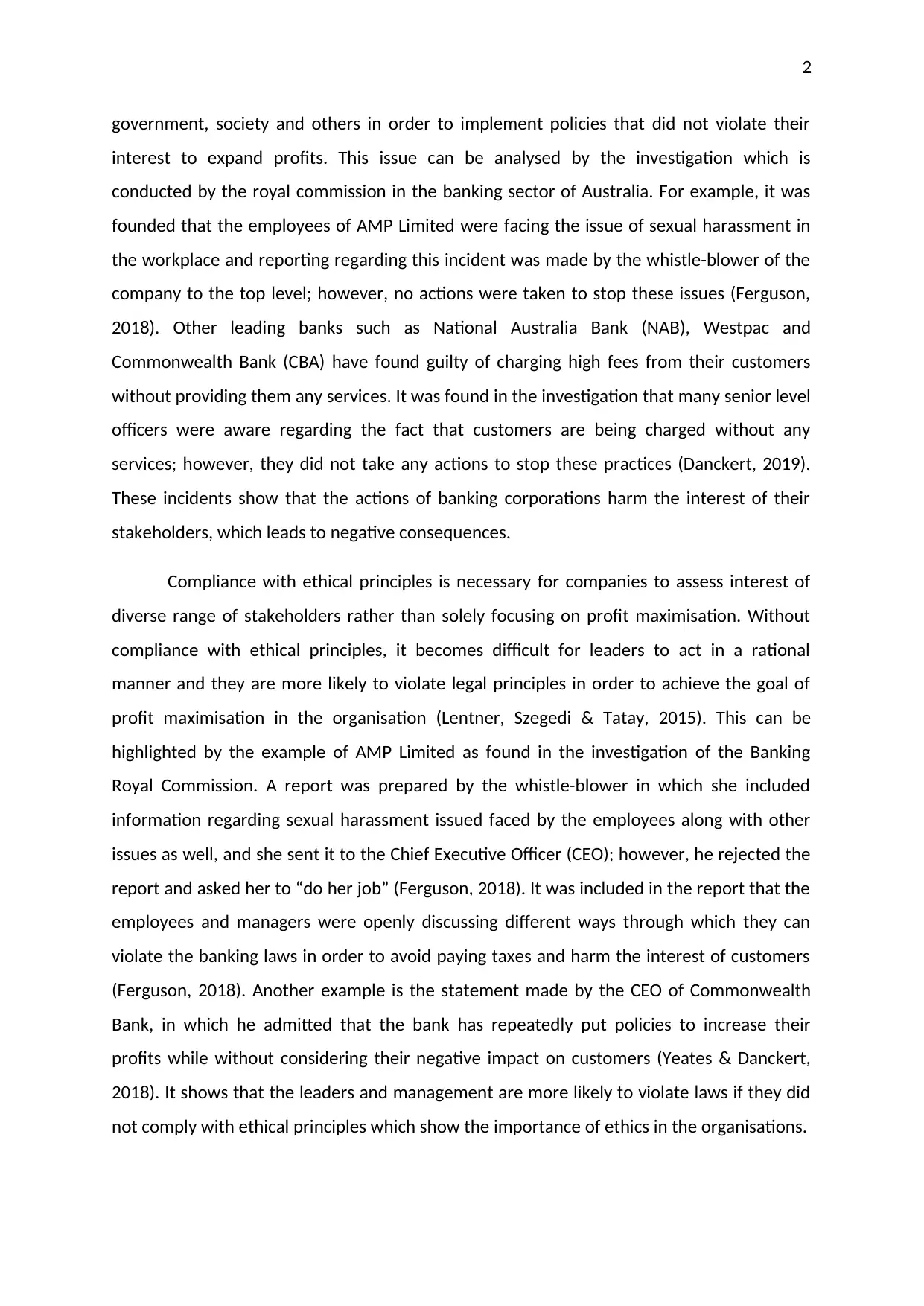
2
government, society and others in order to implement policies that did not violate their
interest to expand profits. This issue can be analysed by the investigation which is
conducted by the royal commission in the banking sector of Australia. For example, it was
founded that the employees of AMP Limited were facing the issue of sexual harassment in
the workplace and reporting regarding this incident was made by the whistle-blower of the
company to the top level; however, no actions were taken to stop these issues (Ferguson,
2018). Other leading banks such as National Australia Bank (NAB), Westpac and
Commonwealth Bank (CBA) have found guilty of charging high fees from their customers
without providing them any services. It was found in the investigation that many senior level
officers were aware regarding the fact that customers are being charged without any
services; however, they did not take any actions to stop these practices (Danckert, 2019).
These incidents show that the actions of banking corporations harm the interest of their
stakeholders, which leads to negative consequences.
Compliance with ethical principles is necessary for companies to assess interest of
diverse range of stakeholders rather than solely focusing on profit maximisation. Without
compliance with ethical principles, it becomes difficult for leaders to act in a rational
manner and they are more likely to violate legal principles in order to achieve the goal of
profit maximisation in the organisation (Lentner, Szegedi & Tatay, 2015). This can be
highlighted by the example of AMP Limited as found in the investigation of the Banking
Royal Commission. A report was prepared by the whistle-blower in which she included
information regarding sexual harassment issued faced by the employees along with other
issues as well, and she sent it to the Chief Executive Officer (CEO); however, he rejected the
report and asked her to “do her job” (Ferguson, 2018). It was included in the report that the
employees and managers were openly discussing different ways through which they can
violate the banking laws in order to avoid paying taxes and harm the interest of customers
(Ferguson, 2018). Another example is the statement made by the CEO of Commonwealth
Bank, in which he admitted that the bank has repeatedly put policies to increase their
profits while without considering their negative impact on customers (Yeates & Danckert,
2018). It shows that the leaders and management are more likely to violate laws if they did
not comply with ethical principles which show the importance of ethics in the organisations.
government, society and others in order to implement policies that did not violate their
interest to expand profits. This issue can be analysed by the investigation which is
conducted by the royal commission in the banking sector of Australia. For example, it was
founded that the employees of AMP Limited were facing the issue of sexual harassment in
the workplace and reporting regarding this incident was made by the whistle-blower of the
company to the top level; however, no actions were taken to stop these issues (Ferguson,
2018). Other leading banks such as National Australia Bank (NAB), Westpac and
Commonwealth Bank (CBA) have found guilty of charging high fees from their customers
without providing them any services. It was found in the investigation that many senior level
officers were aware regarding the fact that customers are being charged without any
services; however, they did not take any actions to stop these practices (Danckert, 2019).
These incidents show that the actions of banking corporations harm the interest of their
stakeholders, which leads to negative consequences.
Compliance with ethical principles is necessary for companies to assess interest of
diverse range of stakeholders rather than solely focusing on profit maximisation. Without
compliance with ethical principles, it becomes difficult for leaders to act in a rational
manner and they are more likely to violate legal principles in order to achieve the goal of
profit maximisation in the organisation (Lentner, Szegedi & Tatay, 2015). This can be
highlighted by the example of AMP Limited as found in the investigation of the Banking
Royal Commission. A report was prepared by the whistle-blower in which she included
information regarding sexual harassment issued faced by the employees along with other
issues as well, and she sent it to the Chief Executive Officer (CEO); however, he rejected the
report and asked her to “do her job” (Ferguson, 2018). It was included in the report that the
employees and managers were openly discussing different ways through which they can
violate the banking laws in order to avoid paying taxes and harm the interest of customers
(Ferguson, 2018). Another example is the statement made by the CEO of Commonwealth
Bank, in which he admitted that the bank has repeatedly put policies to increase their
profits while without considering their negative impact on customers (Yeates & Danckert,
2018). It shows that the leaders and management are more likely to violate laws if they did
not comply with ethical principles which show the importance of ethics in the organisations.
⊘ This is a preview!⊘
Do you want full access?
Subscribe today to unlock all pages.

Trusted by 1+ million students worldwide
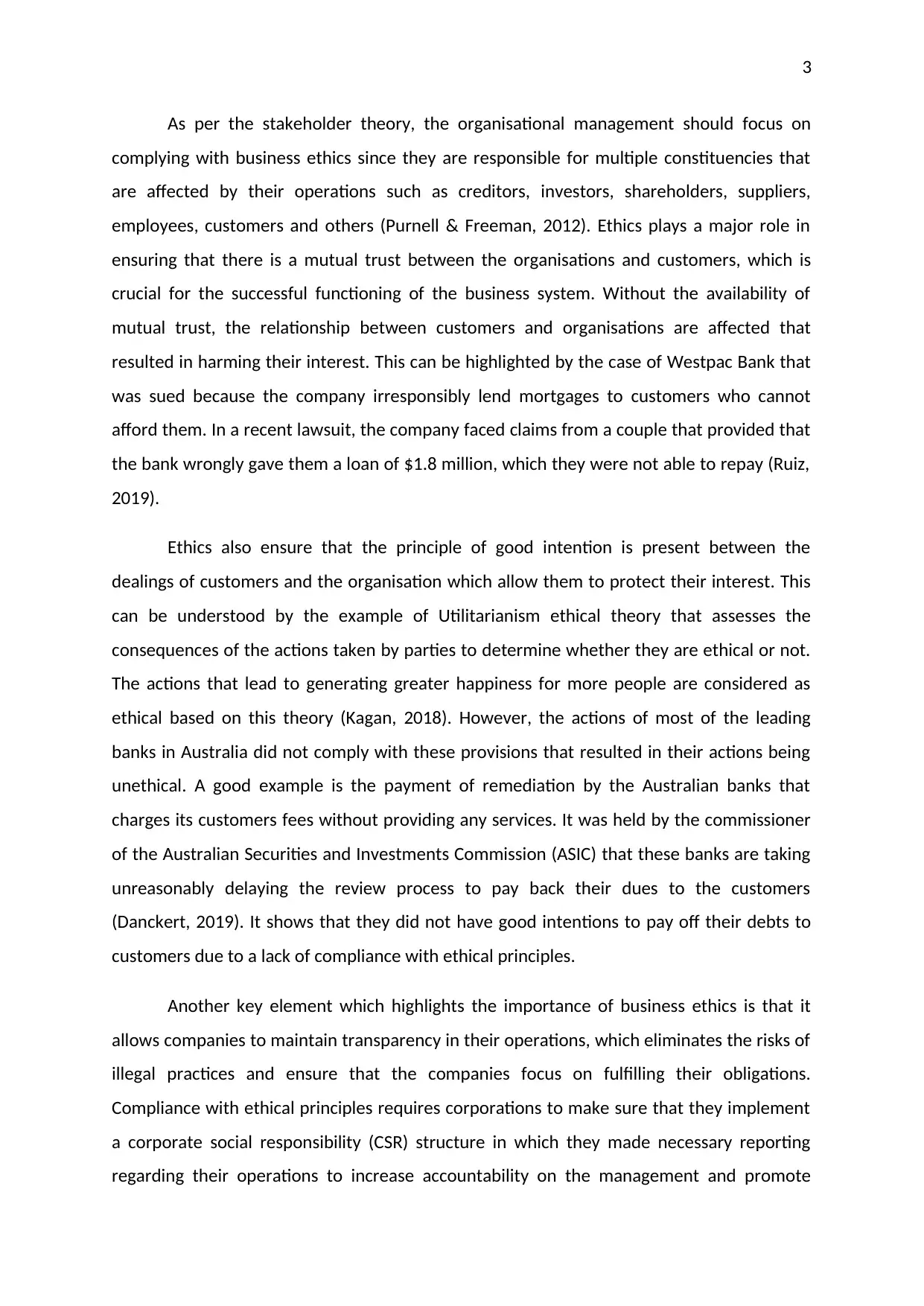
3
As per the stakeholder theory, the organisational management should focus on
complying with business ethics since they are responsible for multiple constituencies that
are affected by their operations such as creditors, investors, shareholders, suppliers,
employees, customers and others (Purnell & Freeman, 2012). Ethics plays a major role in
ensuring that there is a mutual trust between the organisations and customers, which is
crucial for the successful functioning of the business system. Without the availability of
mutual trust, the relationship between customers and organisations are affected that
resulted in harming their interest. This can be highlighted by the case of Westpac Bank that
was sued because the company irresponsibly lend mortgages to customers who cannot
afford them. In a recent lawsuit, the company faced claims from a couple that provided that
the bank wrongly gave them a loan of $1.8 million, which they were not able to repay (Ruiz,
2019).
Ethics also ensure that the principle of good intention is present between the
dealings of customers and the organisation which allow them to protect their interest. This
can be understood by the example of Utilitarianism ethical theory that assesses the
consequences of the actions taken by parties to determine whether they are ethical or not.
The actions that lead to generating greater happiness for more people are considered as
ethical based on this theory (Kagan, 2018). However, the actions of most of the leading
banks in Australia did not comply with these provisions that resulted in their actions being
unethical. A good example is the payment of remediation by the Australian banks that
charges its customers fees without providing any services. It was held by the commissioner
of the Australian Securities and Investments Commission (ASIC) that these banks are taking
unreasonably delaying the review process to pay back their dues to the customers
(Danckert, 2019). It shows that they did not have good intentions to pay off their debts to
customers due to a lack of compliance with ethical principles.
Another key element which highlights the importance of business ethics is that it
allows companies to maintain transparency in their operations, which eliminates the risks of
illegal practices and ensure that the companies focus on fulfilling their obligations.
Compliance with ethical principles requires corporations to make sure that they implement
a corporate social responsibility (CSR) structure in which they made necessary reporting
regarding their operations to increase accountability on the management and promote
As per the stakeholder theory, the organisational management should focus on
complying with business ethics since they are responsible for multiple constituencies that
are affected by their operations such as creditors, investors, shareholders, suppliers,
employees, customers and others (Purnell & Freeman, 2012). Ethics plays a major role in
ensuring that there is a mutual trust between the organisations and customers, which is
crucial for the successful functioning of the business system. Without the availability of
mutual trust, the relationship between customers and organisations are affected that
resulted in harming their interest. This can be highlighted by the case of Westpac Bank that
was sued because the company irresponsibly lend mortgages to customers who cannot
afford them. In a recent lawsuit, the company faced claims from a couple that provided that
the bank wrongly gave them a loan of $1.8 million, which they were not able to repay (Ruiz,
2019).
Ethics also ensure that the principle of good intention is present between the
dealings of customers and the organisation which allow them to protect their interest. This
can be understood by the example of Utilitarianism ethical theory that assesses the
consequences of the actions taken by parties to determine whether they are ethical or not.
The actions that lead to generating greater happiness for more people are considered as
ethical based on this theory (Kagan, 2018). However, the actions of most of the leading
banks in Australia did not comply with these provisions that resulted in their actions being
unethical. A good example is the payment of remediation by the Australian banks that
charges its customers fees without providing any services. It was held by the commissioner
of the Australian Securities and Investments Commission (ASIC) that these banks are taking
unreasonably delaying the review process to pay back their dues to the customers
(Danckert, 2019). It shows that they did not have good intentions to pay off their debts to
customers due to a lack of compliance with ethical principles.
Another key element which highlights the importance of business ethics is that it
allows companies to maintain transparency in their operations, which eliminates the risks of
illegal practices and ensure that the companies focus on fulfilling their obligations.
Compliance with ethical principles requires corporations to make sure that they implement
a corporate social responsibility (CSR) structure in which they made necessary reporting
regarding their operations to increase accountability on the management and promote
Paraphrase This Document
Need a fresh take? Get an instant paraphrase of this document with our AI Paraphraser
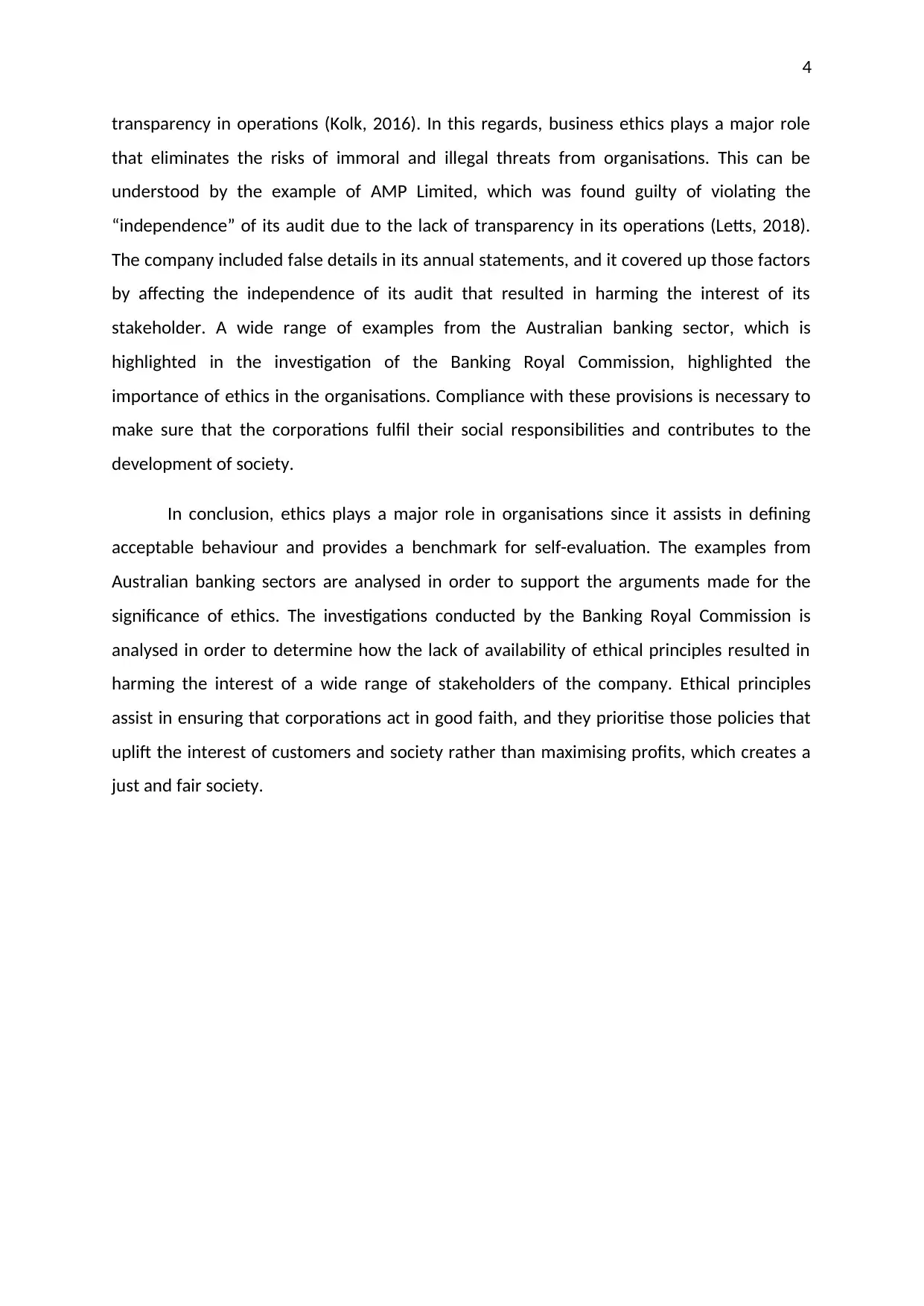
4
transparency in operations (Kolk, 2016). In this regards, business ethics plays a major role
that eliminates the risks of immoral and illegal threats from organisations. This can be
understood by the example of AMP Limited, which was found guilty of violating the
“independence” of its audit due to the lack of transparency in its operations (Letts, 2018).
The company included false details in its annual statements, and it covered up those factors
by affecting the independence of its audit that resulted in harming the interest of its
stakeholder. A wide range of examples from the Australian banking sector, which is
highlighted in the investigation of the Banking Royal Commission, highlighted the
importance of ethics in the organisations. Compliance with these provisions is necessary to
make sure that the corporations fulfil their social responsibilities and contributes to the
development of society.
In conclusion, ethics plays a major role in organisations since it assists in defining
acceptable behaviour and provides a benchmark for self-evaluation. The examples from
Australian banking sectors are analysed in order to support the arguments made for the
significance of ethics. The investigations conducted by the Banking Royal Commission is
analysed in order to determine how the lack of availability of ethical principles resulted in
harming the interest of a wide range of stakeholders of the company. Ethical principles
assist in ensuring that corporations act in good faith, and they prioritise those policies that
uplift the interest of customers and society rather than maximising profits, which creates a
just and fair society.
transparency in operations (Kolk, 2016). In this regards, business ethics plays a major role
that eliminates the risks of immoral and illegal threats from organisations. This can be
understood by the example of AMP Limited, which was found guilty of violating the
“independence” of its audit due to the lack of transparency in its operations (Letts, 2018).
The company included false details in its annual statements, and it covered up those factors
by affecting the independence of its audit that resulted in harming the interest of its
stakeholder. A wide range of examples from the Australian banking sector, which is
highlighted in the investigation of the Banking Royal Commission, highlighted the
importance of ethics in the organisations. Compliance with these provisions is necessary to
make sure that the corporations fulfil their social responsibilities and contributes to the
development of society.
In conclusion, ethics plays a major role in organisations since it assists in defining
acceptable behaviour and provides a benchmark for self-evaluation. The examples from
Australian banking sectors are analysed in order to support the arguments made for the
significance of ethics. The investigations conducted by the Banking Royal Commission is
analysed in order to determine how the lack of availability of ethical principles resulted in
harming the interest of a wide range of stakeholders of the company. Ethical principles
assist in ensuring that corporations act in good faith, and they prioritise those policies that
uplift the interest of customers and society rather than maximising profits, which creates a
just and fair society.
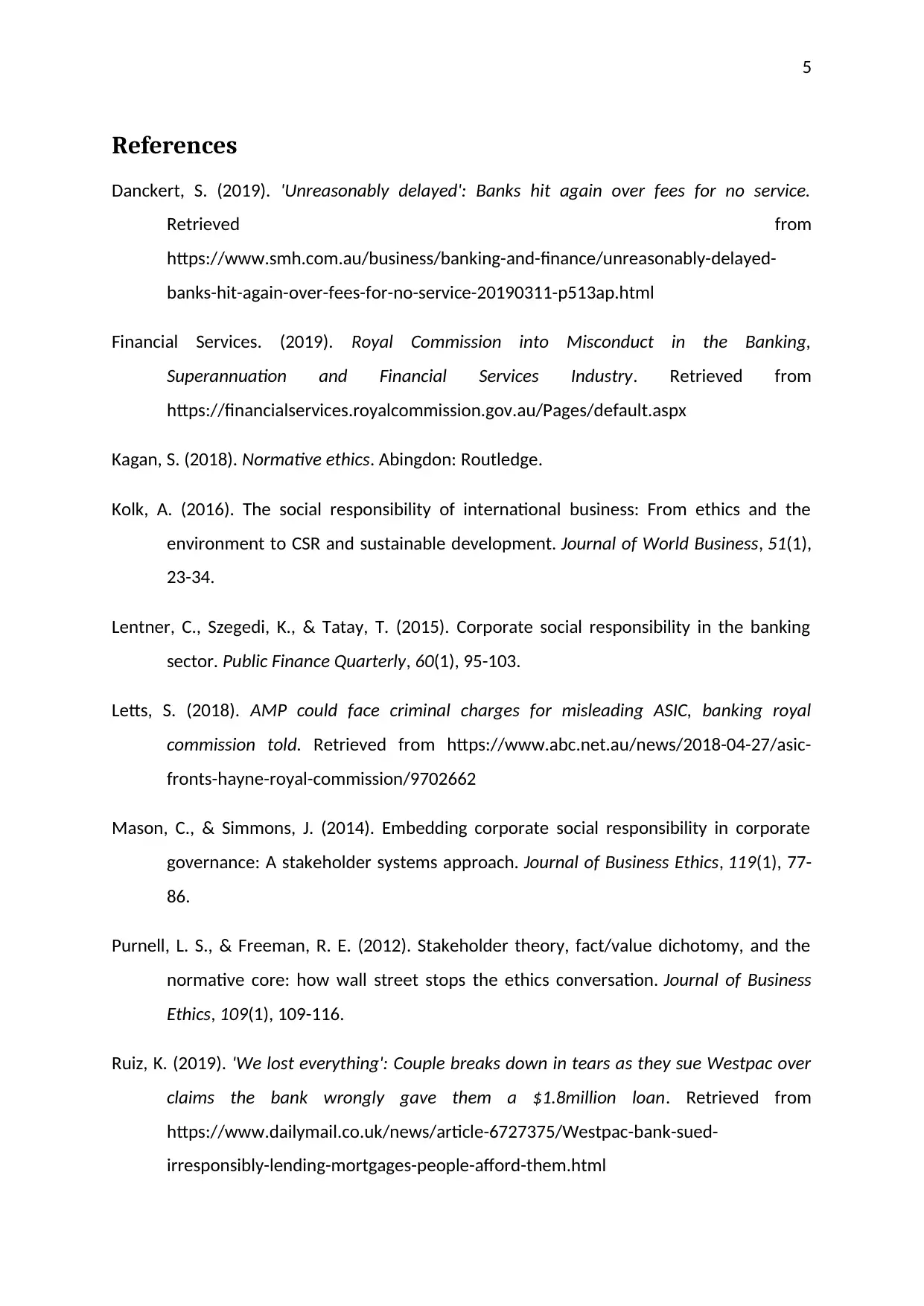
5
References
Danckert, S. (2019). 'Unreasonably delayed': Banks hit again over fees for no service.
Retrieved from
https://www.smh.com.au/business/banking-and-finance/unreasonably-delayed-
banks-hit-again-over-fees-for-no-service-20190311-p513ap.html
Financial Services. (2019). Royal Commission into Misconduct in the Banking,
Superannuation and Financial Services Industry. Retrieved from
https://financialservices.royalcommission.gov.au/Pages/default.aspx
Kagan, S. (2018). Normative ethics. Abingdon: Routledge.
Kolk, A. (2016). The social responsibility of international business: From ethics and the
environment to CSR and sustainable development. Journal of World Business, 51(1),
23-34.
Lentner, C., Szegedi, K., & Tatay, T. (2015). Corporate social responsibility in the banking
sector. Public Finance Quarterly, 60(1), 95-103.
Letts, S. (2018). AMP could face criminal charges for misleading ASIC, banking royal
commission told. Retrieved from https://www.abc.net.au/news/2018-04-27/asic-
fronts-hayne-royal-commission/9702662
Mason, C., & Simmons, J. (2014). Embedding corporate social responsibility in corporate
governance: A stakeholder systems approach. Journal of Business Ethics, 119(1), 77-
86.
Purnell, L. S., & Freeman, R. E. (2012). Stakeholder theory, fact/value dichotomy, and the
normative core: how wall street stops the ethics conversation. Journal of Business
Ethics, 109(1), 109-116.
Ruiz, K. (2019). 'We lost everything': Couple breaks down in tears as they sue Westpac over
claims the bank wrongly gave them a $1.8million loan. Retrieved from
https://www.dailymail.co.uk/news/article-6727375/Westpac-bank-sued-
irresponsibly-lending-mortgages-people-afford-them.html
References
Danckert, S. (2019). 'Unreasonably delayed': Banks hit again over fees for no service.
Retrieved from
https://www.smh.com.au/business/banking-and-finance/unreasonably-delayed-
banks-hit-again-over-fees-for-no-service-20190311-p513ap.html
Financial Services. (2019). Royal Commission into Misconduct in the Banking,
Superannuation and Financial Services Industry. Retrieved from
https://financialservices.royalcommission.gov.au/Pages/default.aspx
Kagan, S. (2018). Normative ethics. Abingdon: Routledge.
Kolk, A. (2016). The social responsibility of international business: From ethics and the
environment to CSR and sustainable development. Journal of World Business, 51(1),
23-34.
Lentner, C., Szegedi, K., & Tatay, T. (2015). Corporate social responsibility in the banking
sector. Public Finance Quarterly, 60(1), 95-103.
Letts, S. (2018). AMP could face criminal charges for misleading ASIC, banking royal
commission told. Retrieved from https://www.abc.net.au/news/2018-04-27/asic-
fronts-hayne-royal-commission/9702662
Mason, C., & Simmons, J. (2014). Embedding corporate social responsibility in corporate
governance: A stakeholder systems approach. Journal of Business Ethics, 119(1), 77-
86.
Purnell, L. S., & Freeman, R. E. (2012). Stakeholder theory, fact/value dichotomy, and the
normative core: how wall street stops the ethics conversation. Journal of Business
Ethics, 109(1), 109-116.
Ruiz, K. (2019). 'We lost everything': Couple breaks down in tears as they sue Westpac over
claims the bank wrongly gave them a $1.8million loan. Retrieved from
https://www.dailymail.co.uk/news/article-6727375/Westpac-bank-sued-
irresponsibly-lending-mortgages-people-afford-them.html
⊘ This is a preview!⊘
Do you want full access?
Subscribe today to unlock all pages.

Trusted by 1+ million students worldwide

6
Trevino, L. K., & Nelson, K. A. (2016). Managing business ethics: Straight talk about how to
do it right. New Jersey: John Wiley & Sons.
Yeates, C. & Danckert, S. (2018). CBA admits to putting profits over customers in historic
grilling. Retrieved from
https://www.smh.com.au/business/banking-and-finance/cba-admits-to-putting-
profits-over-customers-in-historic-grilling-20181119-p50h00.html
Trevino, L. K., & Nelson, K. A. (2016). Managing business ethics: Straight talk about how to
do it right. New Jersey: John Wiley & Sons.
Yeates, C. & Danckert, S. (2018). CBA admits to putting profits over customers in historic
grilling. Retrieved from
https://www.smh.com.au/business/banking-and-finance/cba-admits-to-putting-
profits-over-customers-in-historic-grilling-20181119-p50h00.html
1 out of 7
Related Documents
Your All-in-One AI-Powered Toolkit for Academic Success.
+13062052269
info@desklib.com
Available 24*7 on WhatsApp / Email
![[object Object]](/_next/static/media/star-bottom.7253800d.svg)
Unlock your academic potential
Copyright © 2020–2026 A2Z Services. All Rights Reserved. Developed and managed by ZUCOL.





